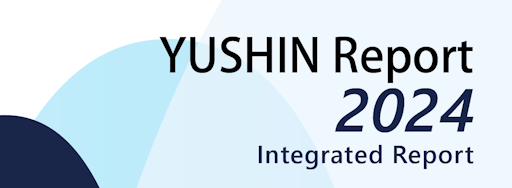
In April, 2022, YUSHIN has declared to support for the recommendations of Task Force on Climate-related Financial Disclosures which is created by Financial Stability Board (FSB.) YUSHIN will further promote its effort against climate change to date, and enhance its disclosure based on the recommendations of TCFD.
Governance
We take climate change as an issue to be addressed in the governance and management system for sustainability. The management meeting is the supreme decision-making body for business execution. The meeting and the Sustainability Committee are both chaired by the Representative Director and President. At the meeting and the committee, all inside Directors
discuss the progress of their commitments on climate change and the identification and assessment of risks and opportunities. The basic policy resolved at the management meeting and Sustainability Committee, and the result of the enforcement are to be reported to the Board of Directors.
Strategy and Scenario Analysis
Our “Environmental Action Policy” is that all employees are committed to contributing to the environment in product development and reducing environmental impact.
The global environmental movement is changing drastically every day, which needs to be properly addressed. We identify risks and opportunities related to climate change and assess the impact on the business.
We clarify the impact of climate change on energy and raw material sourcing risks, the risk of changing customer needs, the risk of extreme weather, average temperature rise, and sea level rise. We will mitigate these risks and turn them into opportunities.
Risk Management
We consider anything that interferes with our business operations to be a risk, and we analyze and assess the immediate risks of climate change as well as those that may arise in the future.
To manage such risks, we identify, analyze and evaluate the risks in all aspects of the business. Such information is compiled in a timely manner and shared with the Board of Directors and the executive meetings. Under the leadership of Representative Director and President, we take prompt and appropriate actions to mitigate the risks.
Indicators and Targets
|
End of FY2031: 70% reduction in greenhouse gas emissions compared to FY2021
|
Following the adoption of the Paris Agreement in 2015, the Japanese government announced that it aims to reduce greenhouse gases by 46% compared to FY2014 levels by 2030.
By the end of FY2031, we aim to reduce the sum of Scope1 and 2 (direct emissions from internal fuel use and indirect emissions from purchased electricity and heat) by 70% compared with FY2021. We will promote the purchase of electricity from renewable sources and introduce environmentally friendly vehicles. We will review these targets in the medium and long term.
In FY2024, we began calculating data for Scope 3 (indirect emissions other than Scope 1 and 2 [emissions from other companies related to our business activities]) in Japan and Scope 1 and 2 overseas. We will continue to work to reduce and disclose greenhouse gas emissions throughout the supply chain.

%202024%2002%2029.png)
